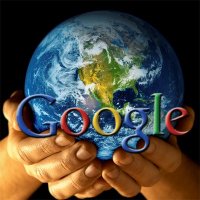Is Google Taking Over the World?
Author: David Amerland, www.helpmyseo.com
 If you found this post using Google search and you are in the habit of sharing content you like through Google Buzz, Gmail and, now Google+ you are one of the many beginning to get the feeling that you inhabit a Googleverse.
If you found this post using Google search and you are in the habit of sharing content you like through Google Buzz, Gmail and, now Google+ you are one of the many beginning to get the feeling that you inhabit a Googleverse.
Google is a company that was born on the web and totally ‘gets it’ in ways that Microsoft, Yahoo! (remember them?) and Apple, don’t. It understands how we use it (and why) and what we would like to do and Google+, Google’s answer to the social web and the challenge of dealing with Facebook and Twitter, is proof enough of this.
Google’s reach, and plans, do not stop here either. Google Music http://music.google.com/about/ and Google eBooks http://books.google.com/ebooks are just pieces in a puzzle being assembled whereby Google will invisibly surround your everyday life. Far-fetched? Consider this: In March this year Google spent almost $100 million http://technorati.com/blogging/article/google-goes-on-a-buying-spree/ buying companies in the online advertising and finance sector. It then announced it would spend another $100 million in prizes on YouTube for original content. http://www.techyfox.com/2011/04/google-to-spend-100-million-on-youtube/
If that was not enough, it expanded Google maps to track public transport http://news.idg.no/cw/art.cfm?id=6CA44465-1A64-67EA-E4E23D64A886D49C, rolled out Google TV http://www.google.com/tv/ and announced at the Google I/O developers’ conference in May ‘Project Tungsten’ http://news.cnet.com/8301-30685_3-20061452-264.html#ixzz1LyLuV2Lx essentially a means through which Google’s very successful mobile operating system, Android, can become the brains driving almost every meaningful piece of electronics in the modern home.
The reason Google has so many fingers in so many pies is because underpinning everything , and our lives, is one common bedrock: information. Google’s public mission statement is “To Index the World’s Information” which, when taken to its logical conclusion, it means everything in the known universe.
Google’s semi-public beef with Facebook was not that the latter had a social network and Google did not but that Facebook refused Google access to the data it held in its Social Graph, creating in effect, a walled garden into which Google’s bots could not peer. When negotiations broke down Google retaliated by creating Google+.
Many have hailed Google+ as Google’s social network and a direct competitor to Facebook but in reality it is nothing of the sort. Whereas the latter created functionality which enabled the user to draw in as much of the web as they could into Facebook, Google+ goes the other way, providing an entire set of tools which are designed to open up the web further and socialise every part of it.
There is an understandable sense of unease about this. If we roll the clock a few years forward we may well see the blue, red, yellow and green flag of Google flying everywhere, from the digital hearts of our homes, to our entertainment systems, work (with the expansion of Google Docs), digital socialising and even our cars (Audi’s latest A7 has a fighter pilot’s heads up display and Google maps integrated as standard). The Googleverse will have us in its grip.
The trillion dollar question is: ‘is this a bad thing?’ Right now, no it isn’t. While Google is a corporation which, like all corporations, is focused on delivering shareholder value and a healthy bottom line, it has also provided a quick response in earthquake zones through its Crisis Response Team http://googleblog.blogspot.com/2011/04/google-crisis-response-small-team.html, experimented with driverless cars http://en.wikipedia.org/wiki/Google_driverless_car at a time when no one else has, and is consistently involved in pushing the envelope of our technology’s performance to enhance our private and public lives.
Left unchecked it might well become so successful that it stifles competition and becomes the only available option in which case yes, things might turn a little bit funny. Funnily enough the one thing keeping Google in check is its own development.
Recently, the fact that Google is bidding on the online video service, Hulu, http://www.searchenginejournal.com/google-bidding-on-hulu/31069/ raised the question whether it can be called a media company. If the definition sticks then it will put a stop to Google’s growth as many of its services will be seen to compete with the same companies it purports to serve through search in which case a conflict of interest develops, anti-trust issues come into the spotlight and Google might be broken up.
It hasn’t yet come to this which means that the company is hopefully aware of the issues and careful not to break any guidelines. As we push into the second decade of Google’s life as a company it is certain that the world is changing rapidly and Google is driving much of that change. We really live in interesting times.

Google rules the present World so far.
Did you mean the world or the universe?
😉